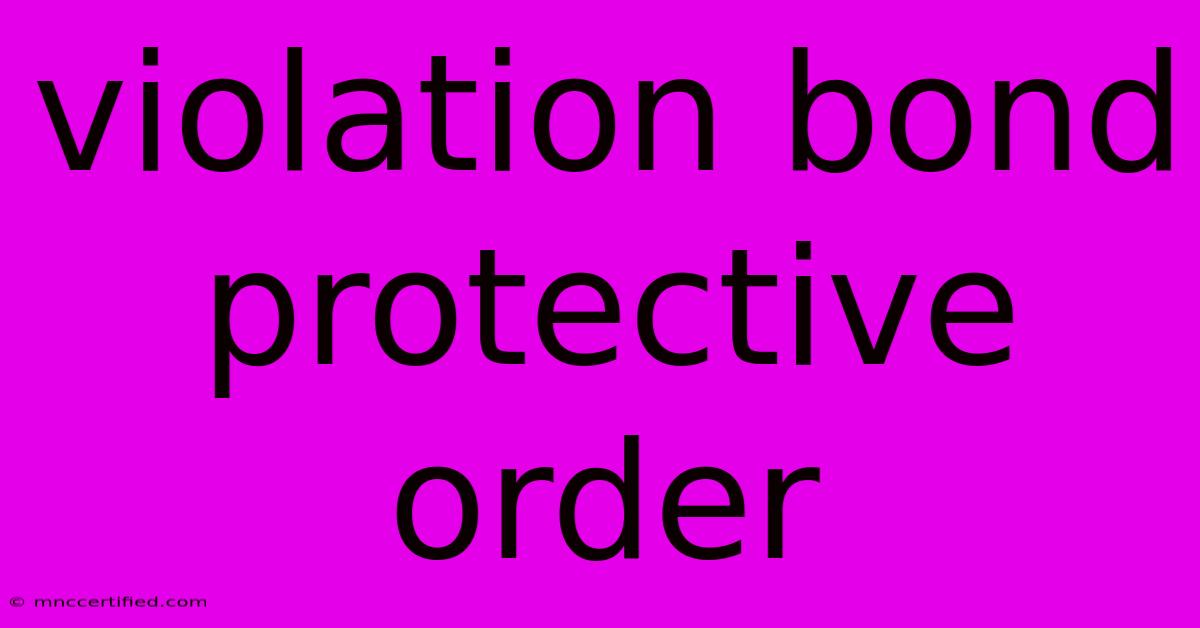Violation Bond Protective Order

Table of Contents
Understanding Violation of a Protective Order Bond
A protective order, also known as a restraining order, is a court-issued legal document that prohibits an individual from contacting or coming near another person. Violating a protective order is a serious crime, often resulting in arrest and potential jail time. Understanding the intricacies of a violation bond protective order is crucial for anyone involved in such a case. This post will explore the legal implications, the process of posting bond, and the potential consequences of further violations.
What is a Protective Order Violation?
A protective order violation occurs when someone subject to a protective order intentionally or unintentionally breaches the terms outlined in the order. These terms can vary widely but typically include restrictions on:
- Contact: This includes direct communication (phone calls, emails, texts) and indirect contact (through third parties).
- Proximity: Staying a certain distance away from the protected person's home, work, or children's school.
- Possession of weapons: In many cases, the order prohibits the individual from owning or possessing firearms.
Even seemingly minor infractions can be considered violations. For instance, accidentally driving past the protected person's house could be construed as a violation, depending on the specifics of the order and the judge's interpretation. The severity of the violation will often influence the consequences.
Types of Protective Orders
It's important to note that different types of protective orders exist, each with its own specific stipulations and penalties for violation:
- Civil Protective Orders: Issued in civil court cases, often involving domestic violence or harassment.
- Criminal Protective Orders: Issued as a condition of bail or sentencing in criminal cases.
The terms and conditions of the order, and therefore the potential for violation, will differ between these types. Understanding the specific terms of your protective order is paramount.
Violation Bond and Bail
If arrested for violating a protective order, the accused might be released on bail. This violation bond is a financial guarantee ensuring the accused's appearance in court. The amount of the bond depends on several factors, including:
- The severity of the violation: A more serious violation will likely result in a higher bond.
- The accused's criminal history: A history of prior offenses will generally lead to a higher bond.
- The judge's discretion: Ultimately, the judge determines the appropriate bond amount.
Failing to appear in court after being released on a violation bond can lead to further legal consequences, including the forfeiture of the bond amount and the issuance of a warrant for arrest.
Consequences of Violating a Protective Order
The penalties for violating a protective order can be severe and vary by jurisdiction. They can include:
- Jail time: Depending on the severity of the violation and the accused's criminal history, jail time can range from a few days to several years.
- Fines: Significant financial penalties can be imposed.
- Increased bond amount: Future bond amounts for any related charges will likely be higher.
- Further legal action: The protected individual can pursue additional civil action, such as seeking damages for emotional distress or other harm caused by the violation.
Seeking Legal Advice
Navigating the complexities of protective orders and their violations requires expert legal counsel. If you are facing charges for violating a protective order, or if you have questions about your rights and responsibilities, consulting with a qualified attorney is crucial. They can explain the specific terms of your order, advise you on your legal options, and represent you in court. Don't risk further legal complications; seek professional help immediately.
Keywords: violation bond protective order, protective order violation, restraining order violation, bail protective order, consequences protective order violation, legal advice protective order, protective order attorney, violation bond amount, types of protective orders, civil protective order, criminal protective order.
This article is for informational purposes only and does not constitute legal advice. Always consult with a qualified legal professional for advice tailored to your specific situation.

Thank you for visiting our website wich cover about Violation Bond Protective Order. We hope the information provided has been useful to you. Feel free to contact us if you have any questions or need further assistance. See you next time and dont miss to bookmark.
Featured Posts
-
Arrest Warrants For Hamas Netanyahu
Nov 22, 2024
-
Consulting To Investment Banking
Nov 22, 2024
-
First Icbm Use Russia Ukraine War Update
Nov 22, 2024
-
Browns Score Last Minute Victory
Nov 22, 2024
-
Judge Overturns Smollett Verdict
Nov 22, 2024